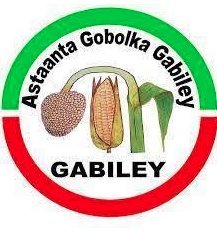Somaliland agriculture in sector is ranked in importance among the productive sectors after the livestock sector with 20 to 25 % of the population depending directly on the sector for their livelihood. Despite many constraints such as unfavorable climatic conditions, inadequate investment capital, inadequate technical capacity, lack of post-harvest technology, inadequate institutional capacity, inadequate agriculture Research and extension, and poor rural infrastructure, the sector has substantial untapped potential that needs to be harnessed.
Somaliland consists of 10 agro-ecological zones of which eight are arid or desert with significant limitation to agricultural production. The total arable land of the country is estimated to be around 350,000 hectares and is concentrated largely on the North-western plateau – Southern Awadal, Gabiley and Maaroodijeex.
Crop production in Somaliland is constrained by a multitude of interacting socioeconomic, biophysical, and technical factors, of which water scarcity is the most important biophysical factor.
Climate related stresses, particularly amount of rainfall precipitations and distribution impact on crop production and productivity. Figures on food imports suggest that crop production and food aid assistance provided by the international community are not keeping up with the domestic demand for food items.
Droughts are the main obstacle for agriculture in Somaliland; however, there are other contributing factors to the poor agricultural performance in the country, such as:
I. Lack of enabling environment for Agricultural development
II. Lack of research and extension
III. Inadequate sustainable water shed management
IIII. Decreased productivity and outputs in agriculture sector
V. Wide spread pest and diseases in the country
VI. Huge post-harvest losses
VII. Promote microfinance and microcredit schemes for farmers
VIII. Limited formal technical Vocational and Educational training (TVET) and farmer field schools
IX. Promote both local and foreign investment interventions on agricultural production
X. Lack of knowledge for potential and utilized national arable land
XI. Inadequate information collection system
XII. Lack of research and extension services
XIII. Poor land use techniques leading to degradation of agricultural land;
XIIII. Inadequate farm machinery equipment
XV. Inadequate support service such input support and credits services;
XVI. Inadequate agricultural infrastructure such as irrigation and feeder roads for production.
XVII. Lack of leadership for innovation agriculture
However, I recommend the following to be adopted by the concerned department to achieve tangible results in the agriculture sector:
Gabble the backbone of Somaliland agriculture
I. Promotion of increased agricultural production
II. Ensuring the country’s food security
III. Create conducive environment for agricultural production and provide subsidized farm implements
IIII. Promote both local and foreign investment interventions on agricultural production
V. Map potential and utilized national arable land
VI. Promote microfinance and microcredit schemes for farmers
VII. Formulation, implementation and monitoring of agricultural legislations, regulations and policies.
VIII. Infrastructure, marketing, trade and investment development.
IX. Technical institutional and human resource development.
X. Sustainable Watershed Management
XI. Manage and control pests and diseases in crops
XII. Ensure availability and sustainability management of water for all.
XIII. Promote appropriate technologies and practices for minimizing post-harvest losses along the entire commodity value chain
XIIII. Supporting agricultural research and promoting technology delivery;
XV. Facilitation and representation of agricultural state Cooperatives in the government;
XVI. Development, implementation and co-ordination of programmes in the agricultural sector
XVII. Regulation and quality control of inputs, produce and products in the agricultural sector;
XVIII. Management and control of trans-boundary pests, diseases and invasive species;
XIX. Documentation and registration of agricultural land
XX. Collection, maintenance and management of information on agriculture sector; and Promotion of sustainable resource management and utilization.
Therefore, Somaliland Government should rethink its policy on food security and find ways and means to resolve the issue given the above mentioned. I think part of the solution lies in the leadership qualities, we need to find an expert who has the capacity to address the issues mentioned above.
By Ivy Hefferman
as ‘Somaliland Farmers Lacking Farming Knowledge’
![]()




























